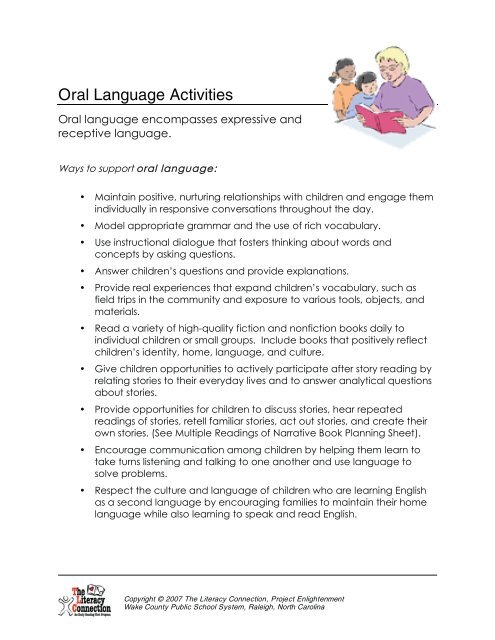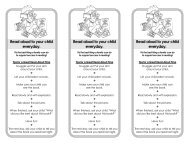Oral Language Activities - The Literacy Connection - Wake County ...
Oral Language Activities - The Literacy Connection - Wake County ...
Oral Language Activities - The Literacy Connection - Wake County ...
You also want an ePaper? Increase the reach of your titles
YUMPU automatically turns print PDFs into web optimized ePapers that Google loves.
<strong>Oral</strong> <strong>Language</strong> <strong>Activities</strong><br />
<strong>Oral</strong> language encompasses expressive and<br />
receptive language.<br />
Ways to support oral language:<br />
• Maintain positive, nurturing relationships with children and engage them<br />
individually in responsive conversations throughout the day.<br />
• Model appropriate grammar and the use of rich vocabulary.<br />
• Use instructional dialogue that fosters thinking about words and<br />
concepts by asking questions.<br />
• Answer children’s questions and provide explanations.<br />
• Provide real experiences that expand children’s vocabulary, such as<br />
field trips in the community and exposure to various tools, objects, and<br />
materials.<br />
• Read a variety of high-quality fiction and nonfiction books daily to<br />
individual children or small groups. Include books that positively reflect<br />
children’s identity, home, language, and culture.<br />
• Give children opportunities to actively participate after story reading by<br />
relating stories to their everyday lives and to answer analytical questions<br />
about stories.<br />
• Provide opportunities for children to discuss stories, hear repeated<br />
readings of stories, retell familiar stories, act out stories, and create their<br />
own stories. (See Multiple Readings of Narrative Book Planning Sheet).<br />
• Encourage communication among children by helping them learn to<br />
take turns listening and talking to one another and use language to<br />
solve problems.<br />
• Respect the culture and language of children who are learning English<br />
as a second language by encouraging families to maintain their home<br />
language while also learning to speak and read English.<br />
Copyright © 2007 <strong>The</strong> <strong>Literacy</strong> <strong>Connection</strong>, Project Enlightenment<br />
<strong>Wake</strong> <strong>County</strong> Public School System, Raleigh, North Carolina
Considerations for children with special needs:<br />
• Determine what the individual child needs in terms of modification of<br />
receiving information, processing information, and/or sharing<br />
information.<br />
• Give children opportunities to use augmentative communication aides<br />
and strategies such as symbols, pictures, and communication displays to<br />
provide them with independence in expression.<br />
• Be sure to include enough wait time after asking a question so that<br />
children can make a response back (count to five).<br />
• Respond to children’s actions and communications (for example, by<br />
describe what children did: imitating, acknowledging, restating).<br />
ORAL LANGUAGE RESOURCES<br />
Copyright © 2007 <strong>The</strong> <strong>Literacy</strong> <strong>Connection</strong>, Project Enlightenment<br />
<strong>Wake</strong> <strong>County</strong> Public School System, Raleigh, North Carolina











